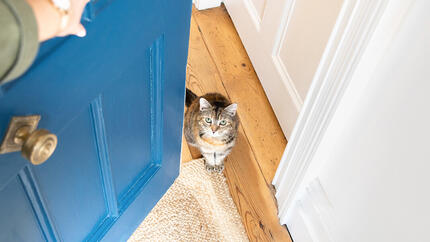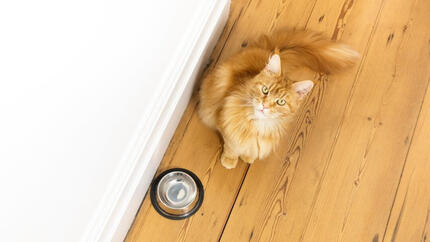


Learning how to discipline your cat correctly is something that’s really important for every cat owner to do.
Cats react differently to dogs, so training them in the same way won’t always work. Instead there are a number of different cat training techniques that can be learnt and performed on your cat to try and encourage them to behave correctly.
Undesirable cat behaviours
Before we learn how to discipline a cat, lets take a look at the type of undesirable behaviours your cat may have and why they may behave that way.
Scratching your home
Scratching items in your house, such as sofas and tables, is a very common behaviour for your cat to showcase. Cats tend to do this to mark their territory or to trim their claws.
This kind of behaviour can be costly, so it’s definitely something you want to teach them to stop doing.
Biting
Biting is a behaviour that many cats tend to show, especially if they have not been trained. One reason cats tend to bite their owners is to show dominance. If a cat is biting you and does not back down, or try to give you a cuddle immediately after, it is usually a sign they are trying to show you who is dominant. This kind of behaviour is particularly undesirable and can affect your relationship with your cat.
Another reason that your cat may bite you is he thinks it’s just playing. Like many animals, sometimes cats can play rough and do not intentionally mean to harm you. This doesn’t mean however that the bites don’t hurt, so this is probably something you still want to discourage when disciplining your cat.
The final reason a cat may bite you is that he is trying to communicate with you. If a cat gives you a small nip and then tries to lead you off in a direction it’s probably a sign they want something. This could be that they are hungry, they want a door to be opened or they are trying to show you something. It’s important to show your cat that biting you in this way wont get them what they want.
Bringing dead animals into the home
As a cat owner, the sight of a dead animal being brought into your home may be all-too familiar. Many cat owners come home to be greeted by a dead bird or small mammal on their living room floor.
Mother cats bring dead animals to their young to not only provide them with food but to also teach them how to hunt. Once the kittens get a bit older mother cats eventually bring back live prey to further encourage these hunting instincts and teach their young.
This is a behaviour that your cat may be replicating with you. Your cat will see you as part of its family and therefore will want to bring out your hunting instincts and train you.
Disciplining your cat
There are a number of do’s and don’ts when it comes to disciplining your cat, take a look at our advice below.
When to discipline your cat
When disciplining your cat, the first tip is to make sure both you and your pet have a strong loving bond. If you and your cat don’t have a good bond, your cat may be less likely to listen to you, which can make training difficult.
The next tip is to try and train your cat at a young age. While this is not always possible, it is much easier to train a cat whilst they are young compared to when they are older and stuck in their ways.
Ways to discipline your cat
The most effective way to encourage good behaviour so you don’t have to discipline your cat is to reward them when they have done well. This reward could be in the form of a small treat that they could eat or even just you showing them attention and affection. This positive reinforcement will encourage a cat to replicate good behaviours. This is especially effective when trying to train cats to use something like a litter box.
Using a special, distinctive tone of voice can be an effective way to communicate with your cat when you don’t approve of their behaviour. Doing this whilst repeating a simple word like “no” can let them know that they are are doing wrong. It’s important that you do not raise your voice and start shouting at your cat – instead just change the tone of your voice.
Another way to discipline your cat and let them know that they are doing wrong is to remove them from the situation. This can be especially effective when cats are trying to take food or are climbing on worktops. If they display this behaviour and you take them out of the room they will learn that eventually the behaviour they are showcasing is wrong.
Repeating the discipline
When disciplining your cat, one of the most important pieces of advice is repetition. Whatever discipline method you take, it’s important you repeat it every time they show that behaviour. If you begin to slip and stop disciplining them, they will get confused as to why sometimes you react to certain behaviours and other times you don’t.
How not to discipline your cat
Now we’ve been through how to discipline your cat, it’s time to look at what not to do. It’s important to remember not to show violence towards your cat when disciplining them. Doing this can make your cat fear you.
Late punishments are something else you want to avoid. If you come home to find your cat has destroyed elements of your home earlier in the day, it may be too late to discipline them. If a lengthy amount of time has passed, they will not understand why you are punishing them, which means the discipline will be ineffective.
You could see a visible difference in just 3 weeks*
Keep your cat healthy by feeding her with PURINA ONE or get your money back.
*PURINA ONE 3 Weeks Challenge - Internal technical support dossier, R&D note written July 2016, revised 2021.

More articles by Purina One















